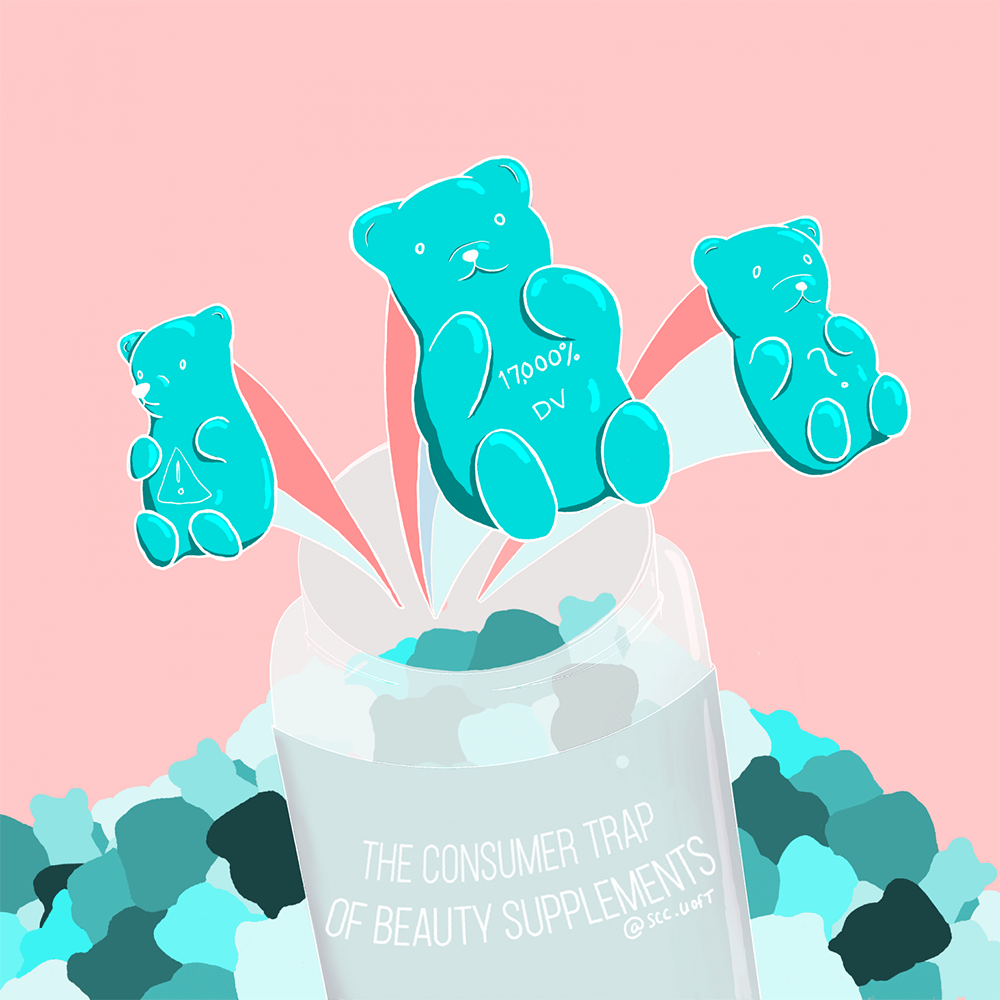
Written by Elakkiya Prabaharan
Illustrated by Eugenia Yi
Have you ever scrolled through the explore page of Instagram and found yourself looking at a picture of Kylie Jenner touting a bottle of SugarBearHair Vitamins? Her Instagram posts, along with a myriad of others on the platform, boldly claim that their long, beautiful tresses (which are probably the product of hair extensions) are thanks to these supplementary vitamins. But how effective are hair, skin, and nail supplements? Do they actually work or are they a consumer trap?
The beauty supplement industry has grown rapidly over the past few years; the global market is expected to be valued at $6.8 billion by 2024. Social media influencers play a crucial role in this industry by marketing these products to their large audiences, even though they may not be taking the supplements themselves. In the age of “fake news” and “false advertising”, discussions about the effectiveness of beauty supplements arose after several celebrities (like Kylie Jenner) faced backlash for promoting a product whose claims weren’t actually backed up by any scientific evidence. In fact, new studies investigating the effects of dietary supplements suggest they do more harm than good. In 2010, Natural Medicines, a U.S.-based therapeutic research organization, compiled a consumer report on the different supplements sold around the world and made an alarming discovery: of the 54,000 different supplements sold globally, 12% of them posed health and safety risks due to poor manufacturing quality control, and nearly two-thirds of the common ingredients listed in these supplements had very little research done about their safety and efficacy.
If you’re wondering why drug companies are allowed to sell these potentially harmful substances in the first place, it’s because the supplement industry is not regulated in North America. The U.S. categorizes supplements as “food”, giving drug companies the leeway to put any ingredients they want in them. This means that they might contain heavy metals usually reserved for prescription drugs. Taking the incorrect dosage of a heavy metal can have detrimental effects on the hormonal balance in our bodies! There’s also a general lack of information about the chemical interactions these supplements might have with other food and drugs. Fortunately, Canada is little better on this front; supplements are categorized as “natural health products” and companies must have their products approved and licensed, which ensures that the ingredients used are safe and that their dosages are effective.
Let’s take a closer look at the efficacy of a very popular supplement: biotin (also known as vitamin B7). Biotin is an essential cofactor, meaning that it’s an essential vitamin that serves an important role in our bodies’ metabolism. Biotin’s involvement in the synthesis of keratin, the biological molecule that strengthens nails and hair, makes it useful when trying to reverse conditions like brittle nails, hair loss and breakage. Although the body’s biotin needs can be fulfilled with a well-balanced diet, beauty supplement companies have convinced consumers that biotin supplements can strengthen your nails and hair. These supplements often contain up to 1,000 μg of biotin in one daily dose, more than thirty times greater than the daily recommended intake of 30 μg! SugarBearHair carries a line of vitamins that are chock full of biotin; one daily dose contains 5100 μg, five times more concentrated than other biotin supplements!
Despite these companies packing their supplements with biotin, there isn’t any scientific evidence demonstrating that biotin supplements actually help with the growth of hair and nails. Unless you suffer from an extreme biotin deficiency—which is an incredibly rare congenital condition—there just isn’t a need to be taking that much biotin every day. If you feel that your daily biotin intake isn’t being met and that your nails and hair are suffering as a result, eating foods like nuts, grains, legumes, and eggs can easily replenish biotin levels in the body as well as provide other important nutrients and healthy fats that are essential for everyday body functions.
If you have any health conditions that you suspect may be the result of a vitamin deficiency, it’s important that you visit your doctor to discuss taking any supplements, since there are many bold claims made by the beauty supplement industry—most of which lack any scientific support. It’s probably best to consider eating a balanced diet or maybe supplementing your current diet with more fruits, vegetables and protein, since most of the vitamins we need come from these major food groups anyway.
Sources:
- https://pubmed.ncbi.nlm.nih.gov/31584785/
- https://www.naturalproductsinsider.com/regulatory/dietary-supplement-regulations-comparing-us-canadian-model
- https://pubmed.ncbi.nlm.nih.gov/28879195/